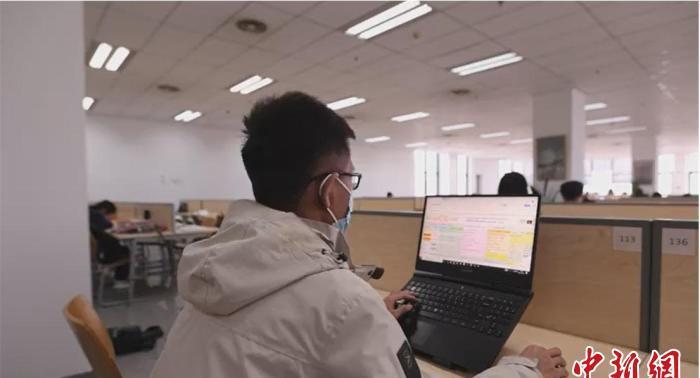
Maintaining the "epidemic mutual aid document" has become Gao Yongkai's daily work. Courtesy of respondents
Xi'an, 8 Jan (China News Network) Title: Xi'an War "Epidemic" Students: Science and Technology Build a "Epidemic Prevention Wall" and "Mutual Aid Documents" Warmly Spread
Author Yang Yingqi
"As college students, we learn a lot and master a lot of skills, but we shouldn't just settle for that." After actively participating in the volunteer work of the "epidemic" and creating the "epidemic mutual aid document", "post-00s" Gao Yongkai told reporters, "I hope to do my best to make the day of the end of the epidemic come sooner." ”
Since 00:00 on December 23, 2021, Xi'an communities (villages) and units have implemented closed management, and the city is still in a critical period of epidemic prevention and control. However, the sudden "epidemic" haze did not disrupt the lives of Xi'an students, and a group of young people worked hard to build an "epidemic prevention barrier" on campus with the knowledge "puzzle".
Gao Yongkai of Xidian University studied communication engineering, and he opened his "anti-epidemic road" with a "mutual aid document on the epidemic". Gao Yongkai introduced that since December 23, 2021, he has been doing document maintenance work. From the initial statistics of epidemic prevention materials to the real-time situation of nucleic acid testing points on campus, the continuous updating of this document also continues the warmth and strength of students to help each other fight against the epidemic.
Zhang Yujian is demonstrating how to use the Meal Selection Mini Program. Courtesy of respondents
"During the epidemic prevention and control period, I put the upcoming online lectures and activities held by the school into the document to facilitate students to understand the latest information. At the same time, the document also has a question-and-answer section and material statistics to help everyone solve problems in a timely manner. Gao Yongkai was pleased that at present, the "epidemic mutual aid document" has been visited by more than 300,000 people, which has become a "treasure book" for students' campus life during the epidemic prevention and control period.
The "epidemic mutual aid document" is on the right track, and Gao Yongkai has pondered a new way to effectively "epidemic mutual assistance". In cooperation with a number of students, they established an information aggregation platform, integrated information through website visualization, high-performance retrieval, etc., and added the estimation function of the length of the nucleic acid test queue in the school. "At present, the platform can be accessed not only through web pages, but also through mini programs, and its portability is higher."
Like Gao Yongkai, Zhang Yujian, who studied in the School of Computer Science and Technology, also chose "science and technology to fight the epidemic" to help prevent and control the epidemic on campus. "At present, only one person in each dormitory can go out and bring food within the specified time, and the length, flow and efficiency of ordering food in the canteen have become very critical." Zhang Yujian said that after the sealing and control management, only the school canteen is the most frequented place for students.
"Many of my classmates, like me, have difficulty choosing, especially when they can't see the menu, which has a big impact on the length of time the students who are responsible for bringing meals stay outside." Zhang Yujian remembered the small program made by his classmates in the elective class, "I found that this program can solve the problem of meal selection, so I slightly modified it and used it online, hoping to help everyone improve the efficiency of queuing and maintain the order of the canteen." ”
The mini program contains a canteen menu, which effectively saves the cost of communication between students. On the first day of launch, this mini program was used by 4191 people, and the server rented by Zhang Yujian "collapsed". "The dean contacted me after seeing the message in the circle of friends and lent me the school's server, and the mini program ran normally again." Zhang Yujian admitted that he did not expect to be able to effectively help so many people, "I am very proud. ”
"This is the joint effort of my classmates, and I can't be credited with it alone." Whether it is designing small programs or creating mutual aid documents, Gao Yongkai and Zhang Yujian always have the same idea. "The students in our school are very friendly and united. Many of our classmates we didn't know, but they took the initiative to ask to get involved. Do something practical for everyone, and they don't ask for anything in return. ”
"The teacher once told me to 'science and technology for good'. In my opinion, it is very romantic to be able to use what I have learned to contribute to the fight against the epidemic. Gao Yongkai said.
Today, the "Epidemic Mutual Aid Document" and the Small Program for Meal Selection are still in use and are constantly updated. When the reporter opened the "epidemic mutual aid document" column called "Xi'an refueling", in the full page of message blessings, a line of red characters was particularly distinct: "Xi'an refueling!" We can definitely usher in Chang'an Chang'an! (End)